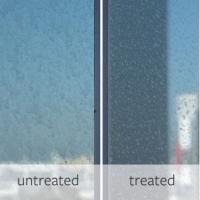Date: 8 February 2012
Virtually every window at St. John's Regional Medical Center in Joplin, Mo., was shattered when an EF-5 tornado slammed the city last May 22. Winds of more than 200 mph propelled millions of shards of glass into rooms and hallways.
The tornado sirens also sounded that day about 25 miles away in Pittsburg, where registered nurse Miranda Johnson helped move patients from rooms at Via Christi Hospital into hallways and interior spaces of the medical-surgical floor. Johnson recalls patients asking: "What about the windows?"
"We pulled the mini-blinds, and I told them we'd keep them as far away as possible," Johnson told The Joplin Globe (http://bit.ly/yxzIUS ).
Within 90 days of the Joplin tornado, officials at Via Christi decided to protect windows with security film that won't stop them from shattering in tornadic winds but will catch and hold bits of glass that would otherwise fly into rooms.
Via Christi's five-story patient tower has windows in every patient room and at the end of every hallway. Hospital spokesman Michael Hayslip said the price tag for the film for 88 windows on the second, third, fourth and fifth floors came to $54,000.
Crews from Dallas-based HanitaTek Window Films were at Via Christi last week, placing film 12 millimeters thick on the windows. After adhering each piece to the glass, the workers clamped frames on the perimeter of the window over the film, with screws holding the frames in place every six inches.
Darrell Smith, executive director of the International Window Film Association, said that technique is preferred because in the event glass breaks, the film contains the glass fragments, and the attached frames hold the film in place.
Smith said the windows might not survive the impact of the debris, but the film itself has 25,000 pounds per square inch of bursting strength.
"Wind speed itself doesn't affect the film; wind speed affects at what point the glass would break," Smith said. "Film on glass can stay in place up to 200 miles per hour, no problem."
Smith said HanitaTek, the company employed by Via Christi, is one of the association's member manufacturers, "and with part of their company in Israel, they are experts with anti-terrorism experience. They are called in all over Europe and the Middle East."
Glenn Yocca, HanitaTek project manager, has installed the film on windows in buildings considered to be terrorist targets or close to terrorist targets, in areas prone to hurricanes, in oil refineries, in banks, in state and federal buildings to comply with government mandates, and in county courthouses.
Johnson said the film will help reassure patients the next time the tornado sirens go off.
"It's a relief," Johnson said. "Now we'll be able to tell them, 'You'll be safe.' And so will we."










Add new comment